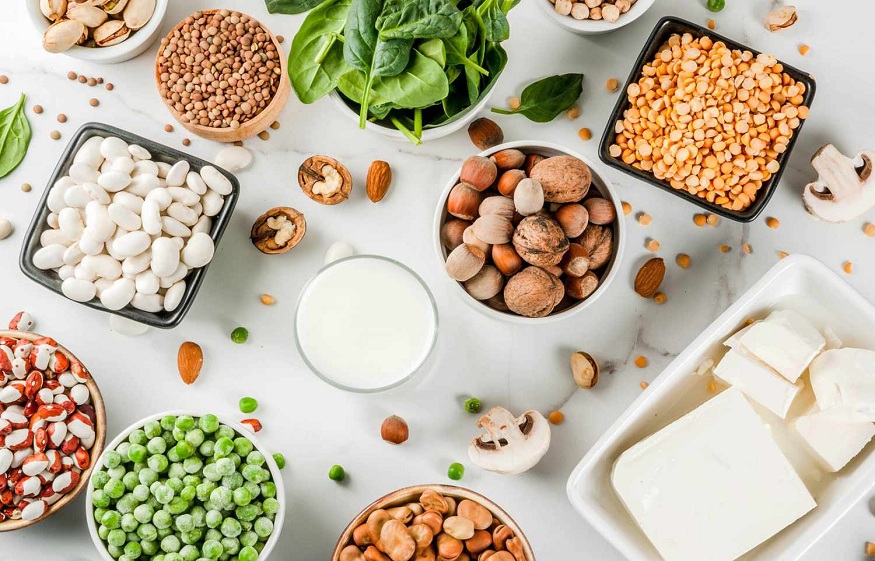Protein is one of the three macronutrients, along with carbohydrates and fats, whose importance is recognized for muscle growth in athletes. If you weight train regularly, you know that protein will help you maintain muscle mass and gain muscle .
Neglecting your dietary protein intake would then be a serious mistake regarding athletic performance and muscle building.
Many foods of animal origin (milk, red meat, white meat, fish, etc.) or vegetable origin (legumes, cereals, etc.) contribute to the daily protein intake of strength athletes. You will find in this article a summary of the foods richest in protein, among all the food groups.
What food to gain muscle?
A balanced, nutrient-dense diet is a solid foundation for athletes and sedentary people alike. However, bodybuilders need extra protein to ensure muscle growth. A sufficient protein diet is then necessary for muscle gain.
Both foods of animal origin such as meat or fish and foods of plant origin such as peas, lentils, soybeans and many others will provide you with protein at each meal. There are also desserts and dairy products in particular. White cheeses and yoghurts also contribute to daily protein intake.
In general, gaining muscle mass involves gaining muscle, including foods to gain weight .
The Importance of Protein
Proteins have several roles to play in the body. They release energy as they strengthen muscles in bodybuilders. In this case, a diet rich in protein is essential .
Amino acids from protein foods strengthen muscle fibers damaged during your strength training exercises. Carbohydrates or lipids cannot help muscle gain since they do not directly build muscle fibers .
What carbohydrate and fat intakes are necessary for bodybuilders?
Carbohydrates and lipids are the energy base of our exercising muscles. Both allow the synthesis of ATP, resulting in an instant release of energy:
They are long chains of glucose. The latter sometimes combine with proteins to form glycoproteins, but their primary role is to make cellular energy .
Fats or lipids are nutrients highly concentrated in energy (9 calories/gram against 4 for glucose). Fats also have a role in hormonal synthesis and the constitution of cell membranes .
In general, 6 to 8 g/kg of body weight of carbohydrates are necessary for strength athletes. 1 to 2g/kilo of body weight in lipids will also be necessary for bodybuilders.
How many grams of protein per day for weight training?
In terms of protein per body weight , most athletes should aim for 1.5 to 1.8 grams of protein per pound of body weight .
For strength athletes , we can only advise you to take between 2 to 2.4 g of protein per kilo of body weight . Indeed, bodybuilding solicits the muscle fibers more deeply than for endurance sports. Dietary protein requirements are therefore higher.
How much protein should you take per day to build muscle?
Building muscle is first and foremost about providing the necessary proteins to your muscles so that they grow, take on volume and gain strength.
In the context of bodybuilding, we consider that an intake of 2 grams per kilo of body weight is recommended. A higher intake (2.5 g/kilo) may be necessary to cope with intense strength training.
How much protein per day to take for mass gain?
Mass gain requires that your dietary protein intake is constant and consistent. In the mass gain phase, a high quantity of carbohydrates must first be supplied to your muscles in order to ensure maximum energy release.
However, sufficient protein should also be provided to allow optimal recovery after intense strength training .
If mass gain requires the intake of carbohydrates and fatty acids in large quantities to ensure optimal energy release and better post-workout recovery, the most common mistake bodybuilders often make is to neglect quality food intakes of protein and amino acids , which reduce muscle protein synthesis.
Sources of protein should therefore be present at all meals. On this subject, do not skip your first meal of the day, especially for protein at breakfast . A teaspoon of peanut butter will also give you a few extra grams of amino acids.
The best natural protein source foods: where to find protein?
Naturally, the best food sources of natural protein are animal since animals have already metabolized all the amino acids they need from plants.
Animal-derived foods, and milk in particular, are excellent sources of protein.
Similarly, milk derivatives such as yogurt or cheese can also be consumed in moderation. In addition, some vegetable sources of protein are also of very good nutritional quality and should not be neglected!
Meats provide you with all the essential and non-essential amino acids
Red meats and white meats are known to provide all the essential amino acids your body needs to synthesize its own

